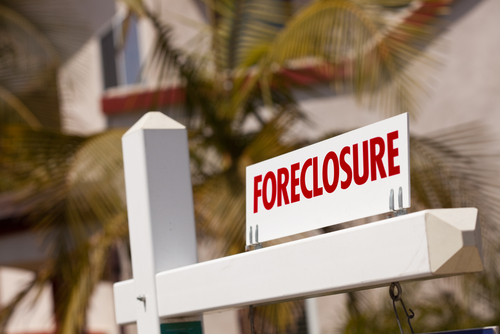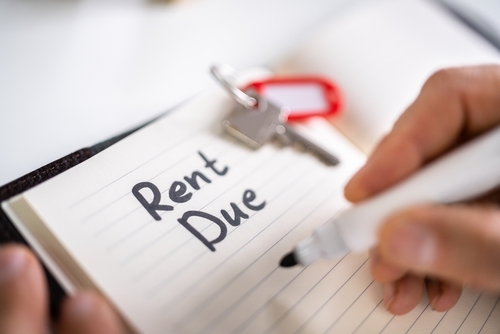Taking out loans for any type of real estate puts buyers at risk of foreclosure if they cannot afford the monthly loan payments. While you may not think of this affecting you while living in a rental property, it can. In today’s blog post, we’ll review what happens when a rental property faces foreclosure and tenant rights in foreclosure situations.
Contents of This Article:
- What Is Rental Property Foreclosure?
- What to Do If Your Landlord Is Facing Foreclosure
- Tenant Rights in Foreclosure Situations
- What Is the Protecting Tenants at Foreclosure Act?
- Protect Your Rentals With Property Management
What Is Rental Property Foreclosure?
Rental property foreclosure happens when a rental property owner faces financial difficulties and fails to make mortgage payments. As a result, the lender or mortgage holder initiates foreclosure proceedings to repossess the property to recover outstanding debts.
In a rental property foreclosure, the tenants living in the property are directly affected by the financial distress of the landlord. For instance, they may face uncertainty about their living situation.

Sometimes, the foreclosure process leads to a change in ownership, or it could lead to potential eviction if the property sells or the lender takes over. If you find yourself in this situation, it’s important to keep open communication with your landlord and property management company in Washington, DC.
During foreclosure, tenants’ rights and protections can vary depending on local laws and regulations. For instance, some jurisdictions have laws to protect tenants, allowing them to continue their lease even after foreclosure. Or sometimes, tenants have a certain notice period to find alternative housing. However, the specific rights and options available to tenants during rental property foreclosure may differ based on local legislation.
What to Do If Your Landlord Is Facing Foreclosure
It can be incredibly stressful if you find out that your landlord is facing eviction. However, there are certain things you can do to protect yourself as a tenant. Next, we’ll review important steps to take and tenant rights in foreclosure situations.
- Don’t Wait to Take Action
- Know Your Rights
- Follow the Lease Agreement
- Prepare to Move
- Get Help From an Attorney
Don’t Wait to Take Action
If you know the property is being foreclosed on, you’ll want to take immediate action. For instance, start up a conversation with your landlord and ask questions about the foreclosure. Getting more information can help you understand the timeline of the foreclosure and give you insight into their plans. However, waiting too long may limit your options if you need to find a new place to live. Addressing the situation early allows you to stay prepared for any changes that may occur.
Know Your Rights
Tenant rights during foreclosure can vary based on where you’re located.

So, research your local laws and regulations to understand your rights as a tenant in a foreclosure situation.
For instance, many jurisdictions offer protections to renters, such as allowing them to remain in the property until their lease expires or providing them with a specific notice period, typically 90 days, before any changes are made. Knowing your rights as a tenant allows you to make informed decisions and advocate for yourself if necessary.
Follow the Lease Agreement
Even if your landlord’s facing foreclosure, you still have to continue to follow the terms outlined in your lease agreement. This includes paying rent on time and maintaining the property as specified in the lease. Following the lease can help you maintain a good standing, which can help if you choose to negotiate with the new property owner or landlord.
Prepare to Move
Although your lease might continue during the foreclosure, circumstances can change. So, be prepared for the possibility that the property’s ownership might transfer to a new owner or lender. While the new owner may honor your existing lease, you’ll want to explore alternative housing options just in case. Oftentimes, they’ll give you around 90 days’ notice to find new housing. However, a backup plan ensures you won’t get caught off guard if circumstances change unexpectedly.
Get Help From an Attorney
If the situation becomes confusing or you’re unsure about your rights as a tenant, you may want to seek advice from a real estate attorney. An attorney who specializes in tenant rights and foreclosure and provides you with a clear understanding of your legal position, potential outcomes, and steps you can take to protect yourself.
Tenant Rights in Foreclosure Situations
Understanding tenant rights in foreclosure situations is crucial to protect renters from abrupt evictions and ensure fair treatment during the foreclosure process. Additionally, you’ll want to know your responsibilities regarding following the lease agreement and the steps you’ll have to take regarding moving out. So, if you or someone you know is living in a property that’s facing foreclosure, here are some key points to consider:
- Lease Continuation- In many jurisdictions, tenants have the right to stay in the renal until their lease term expires, even after foreclosure. As such, the new owner must often honor the existing lease.
- Proper Notice- Landlords must give tenants sufficient notice if the property is facing foreclosure or they’re facing potential eviction. This notice period gives tenants the time to prepare for potential changes.
- Federal Protections- The Protecting Tenants at Foreclosure Act (PTFA) offers federal safeguards to tenants facing foreclosure-related evictions. It provides additional time for tenants to relocate under certain circumstances.

- Rent Payments- Tenant usually must continue paying rent to the new owner or entity specified in the notice, even after the property is foreclosed.
- Security Deposit- The handling of the security deposit may differ after foreclosure. The new owner may be responsible for returning the deposit or transferring it to the new lease agreement.
- Tenant Relocation Assistance- Some areas have programs or laws in place to provide financial assistance or resources to help tenants relocate if they face eviction due to foreclosure.
- Property Inspections- Tenants have the right to privacy, and despite foreclosure, landlords must adhere to that. So, if any inspections are necessary at the property, they must be conducted with proper notice to the tenant.
- Maintenance Responsibilities- Until the foreclosure process is complete, tenants are typically responsible for maintaining the property according to the lease terms.
- Legal Representation- Tenants facing eviction or those wanting more information on their rights during foreclosure should seek legal advice to protect their interests.
- Know Local Laws- Tenant rights in foreclosure situations can vary depending on local and state laws. As such, you’ll want to research and understand your area’s specific rights and protections.
What Is the Protecting Tenants at Foreclosure Act?
The Protecting Tenants at Foreclosure Act (PTFA), enacted in 2009, responded to the housing market crisis and the subsequent wave of foreclosures. It expired originally in 2014 but was officially signed into law in May 2018.

The goal of the PTFA is to prevent tenants from being abruptly evicted due to their landlord’s foreclosure. As such, it allows tenants to stay in their homes for a reasonable period, even after the property changes ownership. Unfortunately, before the law was extended permanently, renters in most states could be evicted with just a few days’ notice.
Now, the PTFA allows bona fide tenants whose homes are in foreclosure to remain there for at least 90 days or for the term of their lease, whichever is longer. Bonda fide tenants are those that meet the following requirements:
- The tenant isn’t part of the landlord’s immediate family.
- The lease or tenancy originates from an at-arm’s length transaction. “At arm’s length” means it’s a legitimate transaction between two people who aren’t friends or family members, with no special terms.
- Rental rates align with fair market values for that area or reduced only due to a government subsidy.
However, some circumstances are different if the foreclosed property is being purchased by someone who will occupy it. In that case, the purchaser can terminate the lease within 90 days’ notice, even if the tenant has a lease that extends beyond 90 days.
Protect Your Rentals With Property Management
Living in rental properties can make housing less stressful for those that can’t afford or don’t want to be homeowners. However, you still have to rely on your landlord to provide safe and habitable housing. Additionally, if they’re financing the home with a mortgage, the landlord is responsible for making the monthly loan payments. If they don’t, it can lead to foreclosure, putting you in a potentially unfavorable situation.
Knowing your tenant rights in foreclosure situations can help you understand your responsibilities, leading to more informed decisions. If you’re unsure of what’s happening with the property your rental property, keep an open line of communication with your property manager. That way, they can update you, send you the proper notices, and help you determine the next action.
If you’re a landlord and want to put more time toward your rental business, consider hiring a comprehensive rental management team. A full-service team like Bay Property Management Group can help you ensure all management tasks are covered. We offer services throughout Baltimore, Philadelphia, Northern Virginia, and Washington, DC. Contact us today to learn more about how we can help your rental business succeed.
